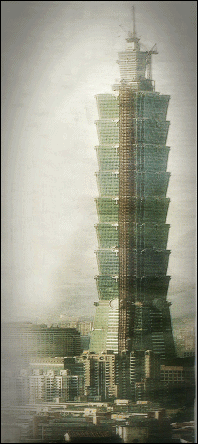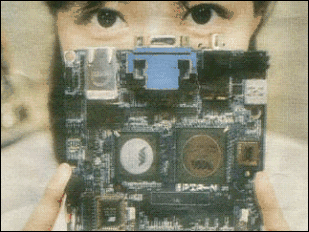Taiwan's lessons for our industries
Dato' Dzulkifli Abd Razak
Article
New Sunday Times - 06/12/2005
THE visit to Taipei 101, the world's highest building, was more than just a touristic event. The tower, that stands at 508m, elegantly pierces through the skyline of the Taiwanese metropolis.
Still, the science and technology adviser to the office of the President remarked that much more still needs to be done.
In higher education, too, there are problems.
Based on a keynote address delivered by a top Taiwanese human resource industrialist at an International Conference on Technological and Professional Higher Education recently, some of the major problems sound familiar.
Among others, student quality is said to be deteriorating, although the quality of teachers is perceived to be getting better.
There is also the issue of "diploma inflation" where graduates who harbour higher expectations do not yield higher quality.
The higher expectations instead create problems of recruiting and retention.
Moreover, it is observed that academic qualifications alone are insufficient, unless it is coupled with what the speaker termed as "emotional and adversity quotients (EQ&AQ)".
Thus, there exists a gap in organisational values and cultural "fit", making partnership and collaboration with the industry even more difficult.

The level of graduate unemployment in Taiwan could be as high as 50 per cent, especially those without a science degree, according to a leading Taiwan academician.
Generally, while the issues and problems seem to be quite similar to that of Malaysia, the Taiwanese seems to more adept in dealing with the situation.
Firstly, they are more focused in looking for solutions without too much fussing about it, not even in the media, thus keeping the issues from being blown out of proportion.
Secondly, they are not “addicted” to government assistance to solve the problems. The Taiwan industrial, community seems equally eager to offer concrete assistance.
In the case of education, for example, given the "inadequacies" identified, most companies take the initiative to invest in their own supplementary job training and development programmes.
Internal efforts at all levels, such as executive teaching programmes by experienced managers, were devised and implemented.
At the professional level, all new employees undergo a six-month on-the-job training and orientation programme.
In addition, there is personal effectiveness training, including English and language skills. Computer and other technical training are also provided.
A distinctive approach is the "Last Mile Programme" where the needs of the students are given due attention.
All these efforts confirm that the Taiwanese industries do not expect the universities to "tailor-make" students for them.
They are prepared to value-add through various supplementary initiatives. This a is where there is a departure a from the practice in Malaysian industries.
Generally, the Taiwan industries are more engaging and less demanding on governmental help all the time.

They seem to share the sentiments expressed by the Taiwanese national policy adviser:
"If the Government always gives in to the demands of the business community, then the issue of how we compete will be of little consequence.
"What we're most concerned about is that Taiwan itself will be forced onto the road to extinction."
Herein, perhaps, lies the secret that allows Taiwan to tower over Malaysia, literally and emblematically.
It is therefore time for the Malaysian industrial community do some rethinking and put their money where mouth is.
Article
New Sunday Times - 06/12/2005
THE visit to Taipei 101, the world's highest building, was more than just a touristic event. The tower, that stands at 508m, elegantly pierces through the skyline of the Taiwanese metropolis.
Still, the science and technology adviser to the office of the President remarked that much more still needs to be done.
In higher education, too, there are problems.
Based on a keynote address delivered by a top Taiwanese human resource industrialist at an International Conference on Technological and Professional Higher Education recently, some of the major problems sound familiar.
Among others, student quality is said to be deteriorating, although the quality of teachers is perceived to be getting better.
There is also the issue of "diploma inflation" where graduates who harbour higher expectations do not yield higher quality.
The higher expectations instead create problems of recruiting and retention.
Moreover, it is observed that academic qualifications alone are insufficient, unless it is coupled with what the speaker termed as "emotional and adversity quotients (EQ&AQ)".
Thus, there exists a gap in organisational values and cultural "fit", making partnership and collaboration with the industry even more difficult.

TAIPEI 101: Proof of Taiwan's technological achievements and confidence.
The level of graduate unemployment in Taiwan could be as high as 50 per cent, especially those without a science degree, according to a leading Taiwan academician.
Generally, while the issues and problems seem to be quite similar to that of Malaysia, the Taiwanese seems to more adept in dealing with the situation.
Firstly, they are more focused in looking for solutions without too much fussing about it, not even in the media, thus keeping the issues from being blown out of proportion.
Secondly, they are not “addicted” to government assistance to solve the problems. The Taiwan industrial, community seems equally eager to offer concrete assistance.
In the case of education, for example, given the "inadequacies" identified, most companies take the initiative to invest in their own supplementary job training and development programmes.
Internal efforts at all levels, such as executive teaching programmes by experienced managers, were devised and implemented.
At the professional level, all new employees undergo a six-month on-the-job training and orientation programme.
In addition, there is personal effectiveness training, including English and language skills. Computer and other technical training are also provided.
A distinctive approach is the "Last Mile Programme" where the needs of the students are given due attention.
All these efforts confirm that the Taiwanese industries do not expect the universities to "tailor-make" students for them.
They are prepared to value-add through various supplementary initiatives. This a is where there is a departure a from the practice in Malaysian industries.
Generally, the Taiwan industries are more engaging and less demanding on governmental help all the time.

HIGH-TECH: Taiwan has a large electronics industry
but the emphasis now is on biotechnology.
They seem to share the sentiments expressed by the Taiwanese national policy adviser:
"If the Government always gives in to the demands of the business community, then the issue of how we compete will be of little consequence.
"What we're most concerned about is that Taiwan itself will be forced onto the road to extinction."
Herein, perhaps, lies the secret that allows Taiwan to tower over Malaysia, literally and emblematically.
It is therefore time for the Malaysian industrial community do some rethinking and put their money where mouth is.
